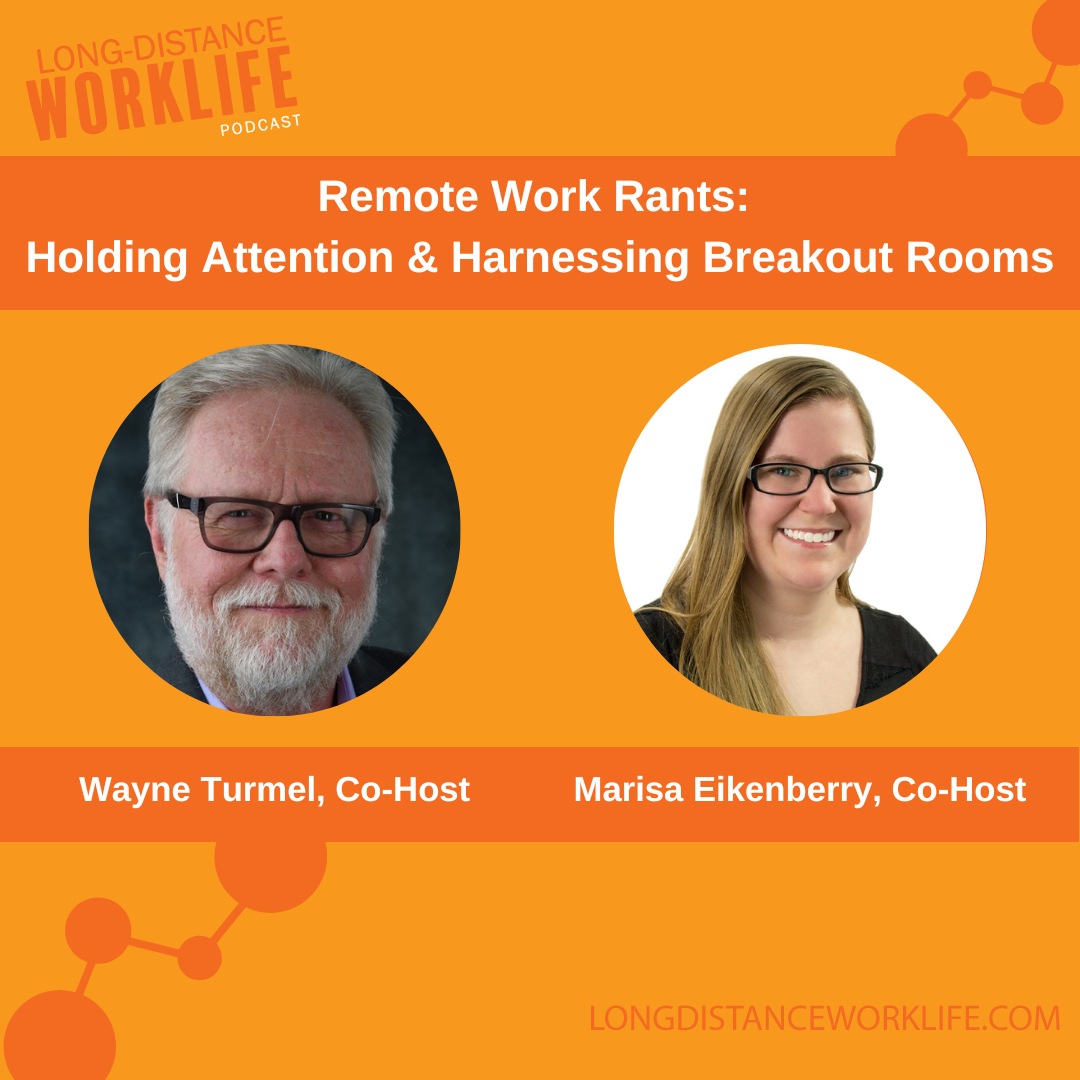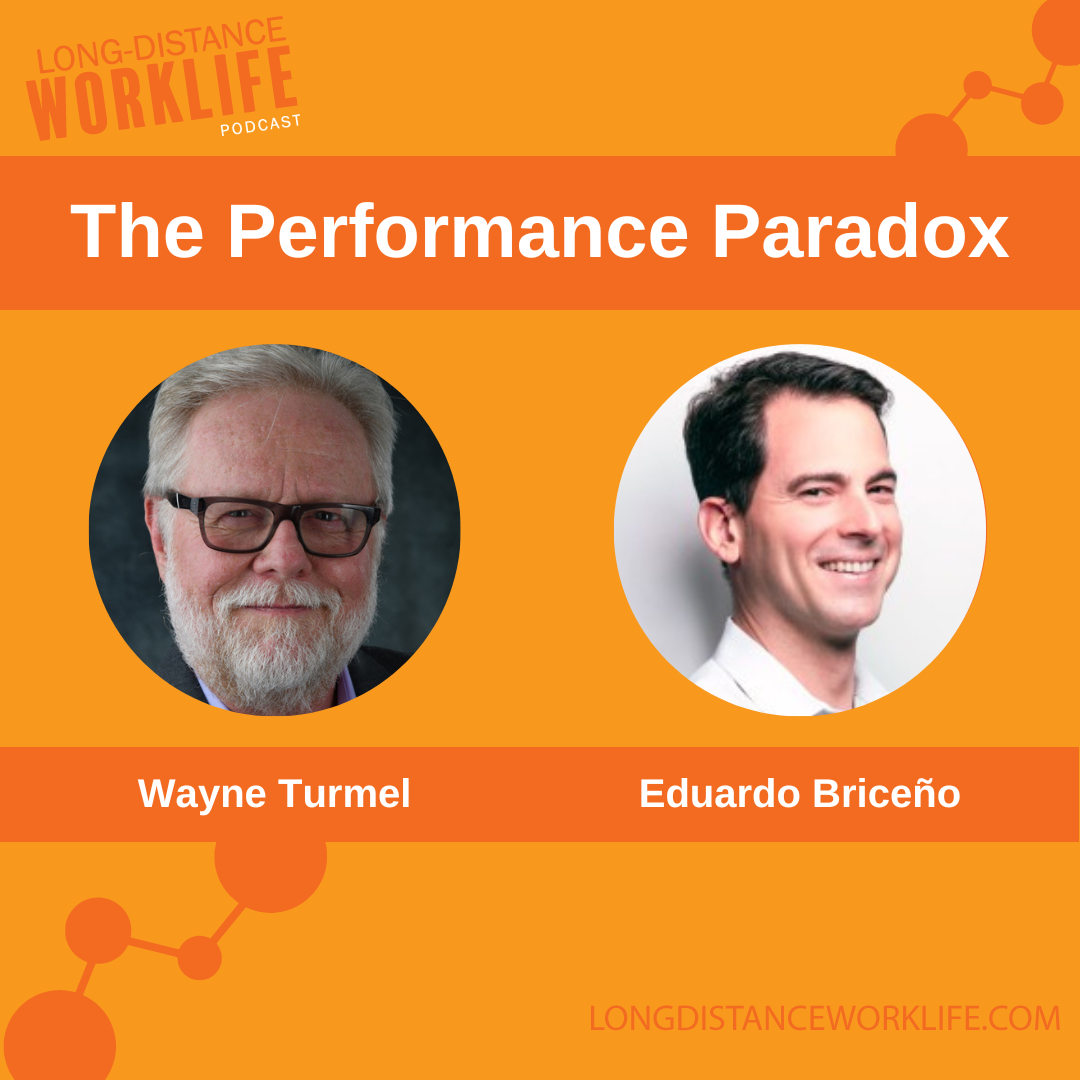Marisa Eikenberry and Wayne Turmel delve into the realm of remote work pet peeves, with a particular focus on virtual meetings. As they banter in their signature casual-yet-business-oriented style, Marisa and Wayne discuss the ups and downs of attention spans, attention-grabbing tactics, and the intricate dynamics of breakout sessions. Sharing insights from their own experiences, they highlight the importance of intentional meeting behavior and how to make breakout rooms truly effective. Tune in to gain valuable tips on managing meeting frustrations and optimizing remote team interactions.
Key Takeaways
1. Attention spans are shorter in virtual meetings, so facilitators should change things up every 6 minutes to keep participants engaged.
2. Meeting behavior is a performance management issue and should be addressed by managers.
3. Breakout rooms can be effective for generating better discussion and involving all participants, but they should have a specific outcome and be relevant to the topic at hand.
00:00:07:23 - 00:00:09:12
Marisa Eikenberry
Welcome back to Long-Distance Worklife.
00:00:09:13 - 00:00:19:02
Marisa Eikenberry
Where we help you lead, work and thrive in remote and hybrid teams. I’m Marisa Eikenberry, a fellow remote worker. And joining me is my co-host and remote work expert Wayne Turmel. Hi, Wayne.
00:00:19:04 - 00:00:21:03
Wayne Turmel
Hello, Marisa. How are you?
00:00:21:04 - 00:00:24:21
Marisa Eikenberry
I'm great. We're talking pet peeves today. Are you excited?
00:00:24:23 - 00:00:31:02
Wayne Turmel
You know, I love when people get a chance to vent. That makes me so happy.
00:00:31:04 - 00:00:51:23
Marisa Eikenberry
Well, I'm happy that we get to do this because. Oh, my gosh, I put out a question on my personal social media. So Twitter, LinkedIn, and my Facebook and said, What do you hate about virtual meetings? And nine of you responded, which does not sound like a lot, but in podcast world, that's a pretty big number. Which also tells you connect with me to get on the show.
00:00:52:01 - 00:00:54:03
Wayne Turmel
But you are.
00:00:54:05 - 00:00:54:10
Wayne Turmel
You.
00:00:54:14 - 00:01:03:17
Wayne Turmel
Know, when we started this show a year ago, she was like, I guess you could kind of contact me if you want. Now she's now she's like the queen of social media.
00:01:03:20 - 00:01:04:06
Marisa Eikenberry
I try.
00:01:05:16 - 00:01:28:06
Marisa Eikenberry
But anyway, so we asked you guys, what do you hate about virtual meetings? So many of you responded, Thank you. We're not going to be able to get through all of them in the show. So we're going to have multiple episodes just like we do with our other pet peeves. So keep sending those in. But I'm going to start with Sam Roberts from Twitter, who says Attention spans are shorter and we're fighting against countless distractions.
00:01:28:12 - 00:01:50:11
Marisa Eikenberry
This means facilitators need to do more prep and think of how to keep the agenda moving, to keep things interesting. I pressed a little harder just to say like, okay, so you're saying to keep things interesting, like our facilities are supposed to do that. She said that for her, she changes up what she's doing every 6 minutes. So thoughts on that as a facilitator for longer than I?
00:01:50:16 - 00:02:20:20
Wayne Turmel
Well, I think the instinct is right, which is that people do have short attention spans. Now, some of this is it's amazing. Attention span is within the normal realms, like if you keep it inside an hour or if you. Yeah, the attention span is discretionary. People are really good at paying attention to things that matter to them. Right.
00:02:21:00 - 00:02:28:12
Wayne Turmel
We are really good at tuning out things that our brain goes, don't care, don't want to know. Oh, look, Squirrel.
00:02:28:14 - 00:02:29:14
Marisa Eikenberry
Right.
00:02:29:16 - 00:02:40:22
Wayne Turmel
Right. So some of this starts before the meeting. I wrote a book, and I know it's a little bit outdated, so this is not a plug for the book, but the title of the book was Meet Like, you mean it?
00:02:41:00 - 00:02:42:12
Marisa Eikenberry
Mm hmm.
00:02:42:14 - 00:03:09:10
Wayne Turmel
Still pretty good advice. Right. Right. Why are we meeting? Is this something that needs to happen? Does the people that do the people that we've invited need to be there? And will they add value to the time to gather? Is this the best alternative as opposed to discussion threads or other asynchronous kind of things? But let's assume for a moment that you have actually made a conscious decision that this meeting matters.
00:03:09:14 - 00:03:13:17
Marisa Eikenberry
Yes. And I assume you have an agenda for said meeting.
00:03:13:19 - 00:03:27:21
Wayne Turmel
Well, that's the next part is do people know why they're there? Do they know what's expected of them? Do they know what the desired outcomes are? You know, have you prepared them to hit the ground running?
00:03:27:23 - 00:03:29:03
Marisa Eikenberry
Right.
00:03:29:05 - 00:03:44:15
Wayne Turmel
And all of that is before you even start your presentation. Now, her point, about every 6 minutes we try to change this is absolutely right. I have said before and gotten in trouble for saying that human beings are like raccoons.
00:03:44:17 - 00:03:45:03
Marisa Eikenberry
Yes.
00:03:45:04 - 00:03:47:22
Wayne Turmel
We're attracted by color, light and motion.
00:03:48:00 - 00:03:50:10
Marisa Eikenberry
Yes.
00:03:50:11 - 00:04:07:03
Wayne Turmel
Are there things going on? And there's a fourth thing on there, which is sound. One of the cardinal sins of online meetings is people hear the same voice for a very long time.
00:04:07:05 - 00:04:08:18
Marisa Eikenberry
Right.
00:04:08:20 - 00:04:23:09
Wayne Turmel
And after a while, our brains can only physically maintain focus on a single voice for a short period of time. After that, you turn into Charlie Brown's teacher. More, more, more, more.
00:04:23:09 - 00:04:23:22
Marisa Eikenberry
Right.
00:04:24:00 - 00:04:25:20
Wayne Turmel
And it's very, very difficult.
00:04:25:20 - 00:04:27:21
Marisa Eikenberry
So we all had one of those teachers.
00:04:27:23 - 00:05:02:06
Wayne Turmel
The six minute rule is is fine. It's a perfectly valid rule. I try to do that by not making people hold their questions till the end. Mm hmm. Right. Doing check ins and not just any questions. Okay, good. But legitimate at check ins every little bit. You know, if you are presenting a slide deck, for example, I actually decide during my as I'm building my presentation where I want to stop and take questions.
00:05:02:08 - 00:05:12:18
Marisa Eikenberry
Yeah. You actually coached me on this on something I'm going to do this weekend. And and that was the idea that in between we're asking them questions about stuff that's relating to what I'm talking about.
00:05:12:20 - 00:05:37:14
Wayne Turmel
Yeah. And so and I know I've mentioned this before. There's this concept called the horror limit, which is that we can only take in seven pieces of information because information comes into our short term memory. We process it. We decide what we need to keep and what we don't and what's worth remembering. And we move that to the oh, yeah, got to remember that pile and that makes room for more stuff.
00:05:37:16 - 00:05:38:11
Marisa Eikenberry
Yeah.
00:05:38:12 - 00:05:48:14
Wayne Turmel
If, as is often the case, because we're trying to cram a bunch of stuff into a short period of time, you just turn on the firehose.
00:05:48:16 - 00:05:49:14
Marisa Eikenberry
Yes.
00:05:49:16 - 00:05:58:18
Wayne Turmel
And just one way. Push information to people. You are going to hit that horror limit wall very early.
00:05:58:19 - 00:06:01:14
Marisa Eikenberry
And then wonder why they forgot X, Y, Z.
00:06:01:16 - 00:06:27:12
Wayne Turmel
And then wonder what I told them. Now, there are a couple of things I'm going to say to this specifically about attention span, because I know we've got a bunch of other cool stuff that we want to address. Number one is don't be afraid of handouts, reference material, stuff that people can look at later.
00:06:27:14 - 00:06:29:05
Marisa Eikenberry
Mm hmm.
00:06:29:07 - 00:07:07:07
Wayne Turmel
You don't have to give them everything and walk them all through it at that point. Right. If you can give them the information beforehand, that will be immensely helpful. But that requires something else. And this is something that managers don't want to talk about, but it's really important. Okay. And that is that meeting behavior is a piece of their job performance.
00:07:07:09 - 00:07:24:10
Wayne Turmel
Yeah. And it needs to be coached like a performance management issue. And that covers both ends of the spectrum. If people are dominating the meetings and not being respectful and not giving people a chance to talk. That needs to be addressed.
00:07:24:12 - 00:07:25:14
Marisa Eikenberry
Absolutely.
00:07:25:16 - 00:08:04:10
Wayne Turmel
If people are constantly logging on and and I'm talking about a convergence of problems, none of these are in and of themselves deal breakers. But if they come on to the meeting and they don't get there, you know, they're not on camera and they don't participate and they're constantly on mute the whole time. And, you know, they basically whine and complain and don't contribute in the chat or anything else.
00:08:04:12 - 00:08:13:20
Wayne Turmel
At some point in your one on ones as a manager, you should go, you know, you're awful quiet on the meetings. What's going on?
00:08:13:22 - 00:08:17:07
Marisa Eikenberry
Yeah. It makes you look like you're not a team player.
00:08:17:09 - 00:08:38:18
Wayne Turmel
And the problem is that that becomes a perception problem. Mm hmm. Right. And when you address that, why aren't you speaking up in meetings? You actually learn stuff. Right, Right. Like, I probably shouldn't be on that meeting anyway. Or I don't want to say anything, because you know how Bob is.
00:08:38:20 - 00:08:39:10
Marisa Eikenberry
Right.
00:08:39:12 - 00:08:54:05
Wayne Turmel
Right. Which tells you that there's a team dynamic issue that needs to be addressed. Yeah. You know, it's like with the camera. Why don't you want to be on camera? Well, I just hate it now. Sucks to be you.
00:08:54:07 - 00:08:57:13
Marisa Eikenberry
Yeah. Or is it a bandwidth issue? In which case you can't really happen.
00:08:57:15 - 00:08:58:11
Wayne Turmel
With the issue.
00:08:58:13 - 00:08:59:10
Marisa Eikenberry
Or anyone else.
00:08:59:12 - 00:09:10:06
Wayne Turmel
My kids are running around. It's it. I just got back from the gym, and if it's. I just got back from the gym, Maybe a little more notice. Mm hmm. Before you call me.
00:09:10:08 - 00:09:11:08
Marisa Eikenberry
Yeah.
00:09:11:10 - 00:09:24:02
Wayne Turmel
Right. None of these things individually are dealbreakers, but when you put them all together, it starts to affect people's ability to pay attention in the meeting.
00:09:24:04 - 00:09:24:18
Marisa Eikenberry
Yeah.
00:09:24:20 - 00:09:47:05
Wayne Turmel
So if you meet, like you mean it. Yeah, right. And you plan it, and you do the work up front and you hold people accountable or. I'm sorry, I use bad language when you help people be accountable. I don't want Kevin on my case.
00:09:47:07 - 00:09:49:18
Marisa Eikenberry
I'm going to send just that clip to him directly.
00:09:49:22 - 00:10:16:04
Wayne Turmel
What, you. Yeah, that would be great. Thank you. When you help people be accountable, if will make a difference. The thing is that meeting behavior over time has kind of devolved because we've allowed it to be devolved. We haven't addressed it. Mm hmm. Nobody says anything. I'm so busy trying to get through the meeting that, you know, I'm just as glamorous.
00:10:16:05 - 00:10:18:11
Wayne Turmel
Kept your mouth shut because I got to get stuff done.
00:10:18:13 - 00:10:42:10
Marisa Eikenberry
Right. You only have so much time to do it. Well, I'm going to go ahead and move on to the next question. But thank you, Sam, for sending that in. And so chat tsunami on Twitter said the stereotypical jokes that we said pre-COVID. And, you know, we get it. Our mike our mike is muted and I'm wearing trousers, let it go.
00:10:42:11 - 00:10:48:09
Marisa Eikenberry
And they also mention that breakout sessions are the bane of their existence. But I don't think we've talked about breakout sessions before.
00:10:48:11 - 00:10:51:15
Wayne Turmel
We haven't. I mean, to the first part.
00:10:51:18 - 00:10:52:23
Marisa Eikenberry
Yeah.
00:10:53:01 - 00:10:55:18
Wayne Turmel
Right.
00:10:55:20 - 00:10:56:12
Marisa Eikenberry
I mean.
00:10:56:14 - 00:11:12:09
Wayne Turmel
People at the office still tend to resent those who don't go into the office every day and will take their little digs right? Yes, you are correct. We should have gotten past that point by now. Yeah.
00:11:12:09 - 00:11:17:10
Marisa Eikenberry
I mean, you know, one third of my working life has been this pandemic remote work. Whatever.
00:11:17:12 - 00:11:26:17
Wayne Turmel
Say that again, louder for the people in the back, because we were talking about this before we started recording. And it's such an important point.
00:11:26:19 - 00:11:47:01
Marisa Eikenberry
Yeah. So full disclosure, I'm 31. I started working at this organization literally the Monday after I graduated college. So I worked here for nine years and one third of my working life has been this pandemic remote work stuff, which is kind of wild when you really think about it.
00:11:47:03 - 00:12:10:19
Wayne Turmel
It's incredibly wild and it means that what was normal in the before times or what was novel or weird no longer is right. We need to just deal with that and get on with it. So I think that's a valid point. What the topic of breakout rooms is really interesting.
00:12:10:21 - 00:12:35:21
Marisa Eikenberry
Yeah, I mean, I've only been in some. I know for me it depends on the meeting that I'm in. So sometimes I don't mind the breakout session because I'm excited about whatever we're talking about and we're going to talk about this project or I like who I'm in the breakout session with, but I've also been in some where, you know, we're the volunteer organizations that I'm in that are talking about leadership stuff.
00:12:35:21 - 00:12:51:16
Marisa Eikenberry
For me, I'm like, I don't even really need to be here because I already know this, but that's beside point. So I get pulled into a breakout room for them and I'm like, Cool, we're going to answer these really fluffy questions that don't really matter, and then we're going to come in and talk about it and yay, rah rah.
00:12:51:18 - 00:12:55:09
Marisa Eikenberry
So I think sometimes it depends on how the breakout session is done.
00:12:55:11 - 00:13:08:11
Wayne Turmel
Okay. Like everything else, if you're going to do something, understand why you're doing it right. You said something which is fluffy whatevers.
00:13:08:12 - 00:13:09:16
Marisa Eikenberry
And we've all been in those.
00:13:09:17 - 00:13:18:12
Wayne Turmel
We have established on this show that Wayne is not a fan of Fluffy ice breakers. They irritate me in general.
00:13:18:14 - 00:13:20:00
Marisa Eikenberry
Right. We have a video.
00:13:20:00 - 00:13:20:13
Wayne Turmel
Hook it up.
00:13:20:15 - 00:13:21:16
Marisa Eikenberry
An icebreaker.
00:13:21:17 - 00:13:48:01
Wayne Turmel
But I'd rather get to the business at hand. So if you are going to do remote or breakout rooms, why are you doing them in training? There is a very reasonable reason, which is sometimes you want different groups to discuss different things. Sometimes it's because you generally get better input in groups of four or five than you would in a room full of 20.
00:13:48:03 - 00:14:12:15
Wayne Turmel
Mm hmm. Everybody gets to speak. You're introverts aren't as intimidated or, you know, the groups tend to generate better discussion and then they come out and they debrief. And it it's it's generally better input. And it's also a great way to jumpstart a meeting that otherwise people join in, they go on mute and there's nothing happening at the beginning.
00:14:12:16 - 00:14:20:13
Wayne Turmel
Mm hmm. If you are doing them just to give them something to do, they are not going to be looked on fondly.
00:14:20:15 - 00:14:21:06
Marisa Eikenberry
Right.
00:14:21:08 - 00:15:00:02
Wayne Turmel
So, you know, they should be relevant to the topic at hand. They should not put people in an embarrassing situation. I think breakout rooms can be very helpful and they're especially helpful if you have the same people, the same large group of people, and they've done it a few times the first time you use a breakout room. It's weird and awkward and people aren't really sure how it works and what they're supposed to do once they've done it a couple of times and it becomes standard operating procedure.
00:15:00:04 - 00:15:26:18
Wayne Turmel
They can be very helpful, but you need to have a specific outcome that there is a reason we'd broken you into small groups. This is what we want. We tend to be very prescriptive. We're in a class and we send people in to breakout rooms. We will, as part of the instructions, say things like The person whose next birthday it is is going to report out.
00:15:26:20 - 00:15:31:02
Marisa Eikenberry
Yeah. Yeah. And then you don't have to do this. Well, do you want to do it? Well, what about you?
00:15:31:04 - 00:16:01:03
Wayne Turmel
Exactly. It's. Here's your assignment. Get to work. Oh, look, you're finished. Your work. Let's report out. Your work is important. We're seeking your input. We respected your input. We've acknowledged your input, and it's added value to the meeting. If you're doing it just to have something light and fluffy to do. And I suspect the person who sent that in a is male.
00:16:01:05 - 00:16:04:22
Marisa Eikenberry
Yes, I know this person. So. Yes.
00:16:05:00 - 00:16:28:20
Wayne Turmel
Yeah. Okay. So, you know, probably not as grumpy and old as me, but certainly grumpy and male and probably focused on Let me do my work. Let's get to work. Let's do what we need to do. And so the the value of the breakout rooms isn't as apparent.
00:16:28:22 - 00:16:29:22
Marisa Eikenberry
Yes.
00:16:30:00 - 00:16:38:03
Wayne Turmel
Because it's being seen as soft and fluffy and getting in the way of the desired outcome of the meeting.
00:16:38:05 - 00:16:43:16
Marisa Eikenberry
Right. I mean, just like we talk about all the time, clear communication is key there.
00:16:43:18 - 00:16:49:23
Wayne Turmel
But it's like everything else. If you're going to do something in a meeting, what is the reason for it?
00:16:50:01 - 00:16:51:09
Marisa Eikenberry
Yeah, don't waste people's time.
00:16:51:11 - 00:17:09:03
Wayne Turmel
If everybody knows everybody, if this team has been together forever, how much of an icebreaker do you really need right. And do we need to go through the mechanics of breaking out into a room and going back? Well, most of us went to the movies this weekend. That doesn't feel.
00:17:09:05 - 00:17:19:08
Marisa Eikenberry
Right. Yeah, but if it's like, hey, we have this one problem that we need to solve and we're going to pull you into breakout sessions so you guys can talk about, you know, how we might be able to approach this a little different.
00:17:19:10 - 00:17:53:15
Wayne Turmel
Well, or, you know, a really common one is you signed up for this course. You signed up for this meeting. What is your top priority? What is the thing that worries you the most about this? What are you most concerned about? That is a very legitimate use. And as the larger the group gets, the more you need to do that, because if you get above the team level, right, if you get above six, seven, eight people, just the group dynamics are going to dictate that some people are going to talk and some people are going to hide.
00:17:53:17 - 00:17:55:10
Marisa Eikenberry
Right.
00:17:55:12 - 00:18:07:22
Wayne Turmel
Breakout rooms if used properly and properly managed, can draw information and involve those people who might otherwise hide or not be heard.
00:18:08:00 - 00:18:28:16
Marisa Eikenberry
Yeah, absolutely. Well, I think that's all we have time for today. But we have so many more. Like I said, we had nine people respond and I'm so excited to get to more of these and future episodes. If you have one, please make sure to send it in. And listeners, thank you so much for listening to the long distance worklife for show notes, transcripts and other resources.
00:18:28:16 - 00:18:45:16
Marisa Eikenberry
Make sure to visit long distance worklife dot com. If you haven't yet subscribe so you won't miss any future episodes. And while you're there, be sure to like and review. This helps us know what you love about our show. Feel free to contact us via email or LinkedIn or any of our social media profiles. Those are all in our show notes.
00:18:45:17 - 00:18:46:07
Marisa Eikenberry
And let us know.
00:18:46:07 - 00:18:54:00
Wayne Turmel
You should know by now that Marissa is apparently the queen of social media and she does listen when people tell her stuff.
00:18:54:05 - 00:19:16:01
Marisa Eikenberry
So yeah, it's really true. If you want to talk to somebody about the podcast, talk to me. That is that is not a secret. But anyway, if you have pet peeves, if you have topics that you want us to tackle, if you know thoughts, general, whatever, like email us, talk to us, send me a message. I get so excited when I hear from listeners, so please do that.
00:19:16:03 - 00:19:27:22
Marisa Eikenberry
And if you'd like to learn more about remote teams, order Wayne and Kevin Barry's new book, The Long Distance Team, you can learn more about the book at Long Distance Team BBC.com. Thanks for joining us. As we like to say, don't let the weasels get too down.
Timestamps
00:00:00 Introduction
00:00:19 Discussion about virtual meeting pet peeves
00:01:28 Attention spans are shorter and distractions are a challenge
00:03:09 Importance of meeting preparation and clear objectives
00:04:07 The need to change things up every 6 minutes
00:05:49 The impact of long monologues on attention span
00:06:29 The value of providing handouts and reference materials
00:07:07 Meeting behavior as a performance management issue
00:08:04 Addressing issues of dominant or unengaged meeting participants
00:08:17 The perception problem of not actively participating in meetings
00:08:38 Team dynamic issue needs to be addressed.
00:08:54 Camera and bandwidth issues affect meeting participation.
00:09:10 Lack of notice and distractions affect meeting engagement.
00:09:24 Meeting behavior has devolved due to lack of accountability.
00:10:42 Stereotypical jokes and breakout sessions as meeting challenges.
00:11:26 Remote work during the pandemic is a significant portion of work life.
00:12:10 Breakout sessions can be effective if done purposefully.
00:13:08 Fluffy ice breakers are not favored by Wayne.
00:14:20 Breakout rooms should have a specific outcome and purpose.
00:16:43 Clear communication and not wasting time are essential in meetings.
00:16:50 Reason for doing something in a meeting
00:17:09 Icebreaker activities in meetings
00:17:19 Using breakout sessions to solve problems
00:17:53 Importance of involving all participants in larger group meetings
00:18:08 Proper use and management of breakout rooms
00:18:28 Closing
Related Episodes
Additional Resources
- Learn more about Wayne Turmel
- Email Wayne Turmel
- Connect with Wayne Turmel on LinkedIn
- Learn more about Marisa Eikenberry
- Email Marisa Eikenberry
- Connect with Marisa Eikenberry on LinkedIn
- Purchase a copy of The Long-Distance Leader
- Purchase a copy of The Long-Distance Teammate
- Purchase a copy of The Long-Distance Team
- The Kevin Eikenberry Group
Order The Long-Distance Team
Remote leadership experts, Kevin Eikenberry and Wayne Turmel, help leaders navigate the new world of remote and hybrid teams to design the culture they desire for their teams and organizations in their new book!






